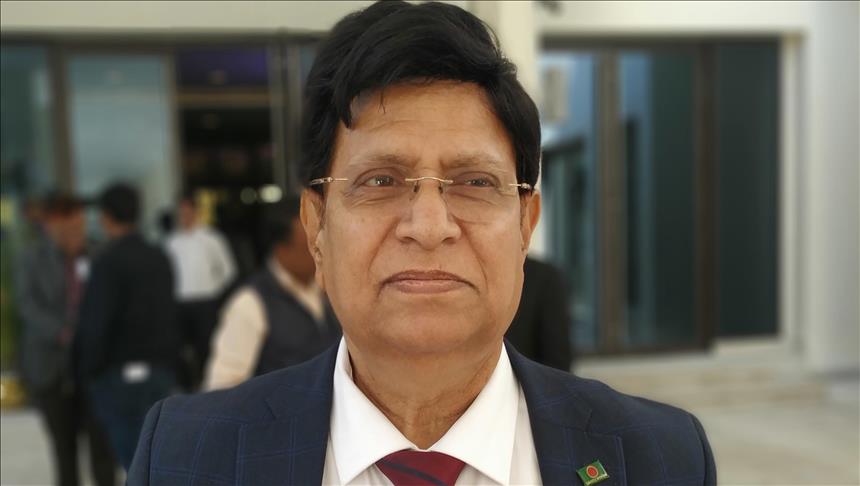Bangladesh seeks safe zone for Rohingya refugees
Bangladeshi FM in interview with Anadolu Agency urges China, Russia and India to help tackle refugee crisis
 Bangladeshi Foreign Minister AK Abdul Momen
Bangladeshi Foreign Minister AK Abdul Momen
Ankara
By Md. Kamruzzaman
DHAKA, Bangladesh
Bangladeshi Foreign Minister AK Abdul Momen has called on Russia, China and India to help the country tackle the Rohingya refugee crisis.
In an interview with Anadolu Agency on Sunday, Momen talked about a government proposal to establish a safe-zone in Rakhine State in Myanmar from where the refugees fled state persecution in late 2017.
“If a safe zone is created under the vigilance of China, Russia and India along with ASEAN states, Rohingya people will be encouraged to return to their own land," he said, adding that guaranteeing them citizenship upon their return is a pre-condition.
He said that India had appreciated the proposal and he hoped other countries followed suit.
Since Aug. 25, 2017, more than 750,000 Rohingya refugees, mostly women and children, have fled Myanmar and crossed into Bangladesh after Myanmar forces launched a crackdown on the minority Muslim community, according to Amnesty International.
The UN has also documented mass gang rapes, killings – including of infants and young children – brutal beatings and disappearances committed by Myanmar state forces.
Myanmar authorities are still treating Rohingya as unlawful citizen or illegal Bengalis based on a controversial 1982 Citizenship Law.
“Our main goal is to repatriate them to their country of origin with due dignity and safety,” the minister said seeking help from Russia, India and China in this regard.
Bangladesh and Myanmar signed a repatriation deal on Nov. 23, 2017 with a two-year timeframe to return the Rohingya refugees to Myanmar.
The repatriation has been postponed due to global concerns about the safety of Rohingya in their home country.
Dearth of resources
Terming the Rohingya crisis a difficult issue, the minister said: “There are 1.2 million Rohingya now staying in Bangladesh. Although we are not a rich country, we are one of the most densely populated countries in the world. Yet she [Prime Minister Sheikh Hasina] has the benevolence, the big heart to allow them and by this she has saved humanity.”
He offered to send some refugees to friendly countries of Myanmar so that the living conditions of the refugees improve and together these states can put pressure on Myanmar to take back the refugees.
The top diplomat termed Bangladesh's policy on Rohingya "a role model for humanity", calling their persecution "the biggest genocide since World War II".
Nearly 24,000 Rohingya Muslims have been killed by Myanmar’s state forces, according to a report by the Ontario International Development Agency (OIDA).
More than 34,000 Rohingya were also thrown into fires, while over 114,000 others were beaten, said the OIDA report, titled "Forced Migration of Rohingya: The Untold Experience."
Some 18,000 Rohingya women and girls were raped by Myanmar’s army and police and over 115,000 Rohingya homes were burned down and 113,000 others vandalized, it added.
The foreign minister said the influx of refugees was triggered by Myanmar's policy and it should be held accountable.
“Now the question is how long we give them temporary shelter. They must go back to their country of birth. The problem has been created by our friendly country Myanmar, and they should resolve it.”
- Risk of radicalization
He warned that Rohingya refugees living in squalid makeshift settlements in the southern part of the country are at a risk of radicalization.
“If it lingers for a long period our fear is that there could be rise of radicalism, instability and uncertainty. This may cause difficulties not only for Myanmar and Bangladesh but also for the whole region.”
Momen, however, assured that the Bangladesh government is dealing with the crisis with utmost sincerity and watchfulness, resulting in no report of radical activity until now.
In reply to a question about the foreign policy of Bangladesh, the minister said: “The essence of our foreign policy is friendship to all and foe to none […]. We have no enemy and so we will inculcate our friendship more solidly with all.”
Anadolu Agency website contains only a portion of the news stories offered to subscribers in the AA News Broadcasting System (HAS), and in summarized form. Please contact us for subscription options.







